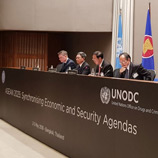 3 May 2018 - Amid changing transnational organized crime and security threats, UNODC and the Government of Thailand organized this week a high-level conference on border management and security across the Association of Southeast Asian Nations (ASEAN) region.
3 May 2018 - Amid changing transnational organized crime and security threats, UNODC and the Government of Thailand organized this week a high-level conference on border management and security across the Association of Southeast Asian Nations (ASEAN) region.
200 participants, representing ASEAN Member States, development banks and the United Nations, gathered in Bangkok as Deputy Prime Minister and Justice Minister of Thailand, Prajin Juntong, opened the conference.
Mr. Juntong said: "ASEAN economic and trade flows will continue to increase. While this is positive, it also provides increased opportunities for transnational crime groups who do not respect our borders. Illegal activities like trafficking often mirror legal flows and movements of goods and services, and as the economy expands criminal and even terrorist networks will look for ways to benefit."
"This is why we are partnering with UNODC on border liaison offices. They have the ability to gather States to discuss problems and formulate strategies, but also to offer practical solutions," Mr. Juntong added.
Trade flows within Southeast Asia have quadrupled over the past decade and are estimated to reach US$ 375 billion per year by 2025. Similarly, infrastructure is being connected and planned to facilitate fast and efficient cross-border movements.
In parallel to these positive achievements, the criminal economy of East and Southeast Asia is growing, with conservative estimates of the value of transnational organised crime revenues exceeding US$ 100 billion annually - more than the gross domestic product of several ASEAN Member States.
There are noticeable changes underway in the region, including a significant increase in synthetic drug production and trafficking, growing timber and wildlife trafficking, as well as indications of new human trafficking and migrant smuggling patterns.
On that point, Minister for Transport of Thailand, Arkhom Termpittayapaisith, noted: "What we see as opportunities for economic and social development are seen by others as openings to expand cross-border criminal activity."
Mr. Termpittayapaisith stressed that "for ASEAN, the relevance of border management can only increase as significant investments are being made in infrastructure across the region." Measures to address security concerns need to be integrated during the planning phase, he underlined.
Also speaking at the event, UNODC Regional Representative for Southeast Asia and the Pacific, Jeremy Douglas said: "As ASEAN integration continues and accelerates, the disparities between countries of the region are becoming more obvious, and this includes significant differences in capacities to manage borders. The problem is that transnational organised crime takes advantage of disparities and vulnerabilities."
"We have the right mix of public security, trade, investment and diplomatic officials here to discuss the challenges and solutions. UNODC will continue to assist the region, and what is agreed here will be supported at a practical level through our border management and other development programmes," Mr. Douglas added.
The high-level conference is the fourth on border management organized by Thailand and UNODC, and it builds on recent strategic discussions related to the Association's economic and security integration.
In 2015, UNODC started collaborating with Thailand on border management while also scaling-up technical assistance to Member States with a view to securing borders from crime. UNODC now supports 76 border liaison office locations across the Mekong region and will be expanding the network to other parts of Southeast Asia.
Solutions to secure borders - land, maritime, ports, and airports - will be the focus of a roadmap for ASEAN border management. The document, to be announced in 2019, will outline actions necessary at the policy, investment, and operational levels to align regional security and economic agendas.
UNODC's work on Transnational Organised Crime